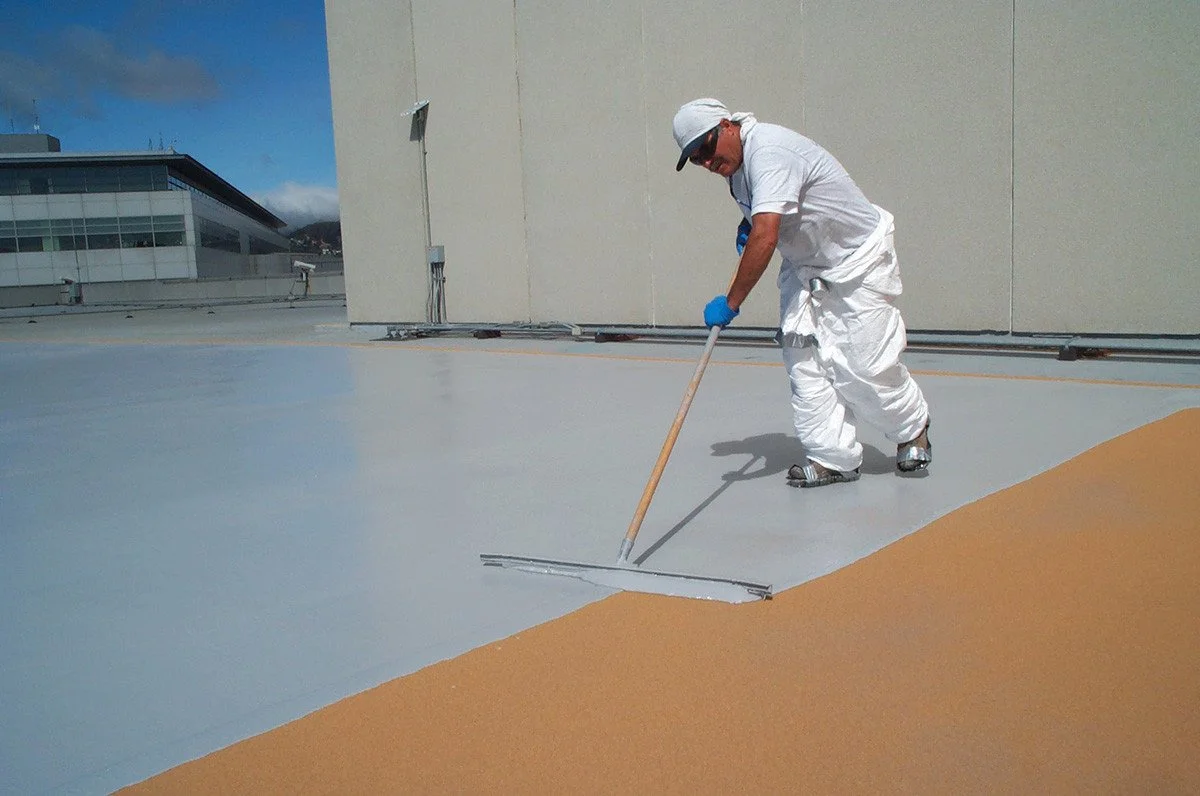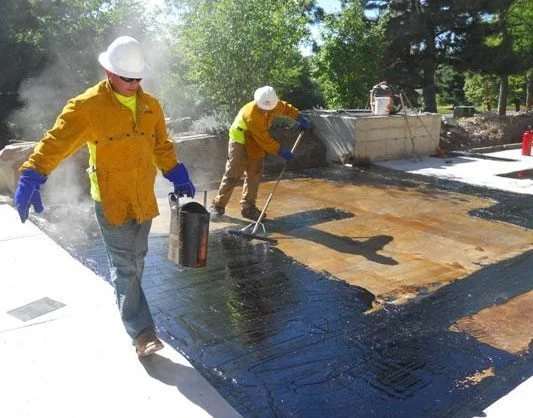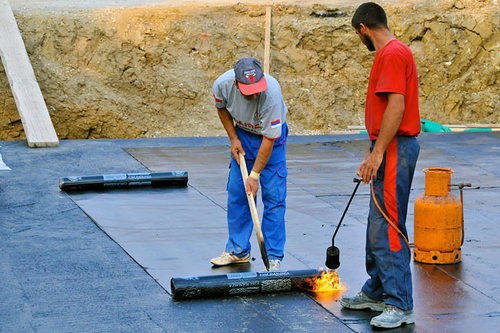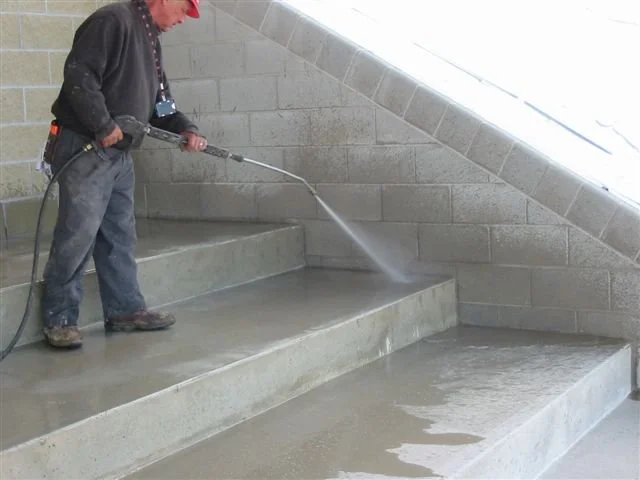Different types of waterproofing
1. Polyurethane Waterproofing
Polyurethane stands as one of the top-tier waterproofing materials, known for its seamless application and deep surface penetration capabilities. Its unique property allows it to fill even the finest cracks in concrete, significantly reducing the surface's water absorbency. Moreover, polyurethane exhibits impressive resistance to various chemicals, oils, and detergents, making it one of the most versatile waterproofing materials available. Its adaptability extends to various structures, including walls, balconies, and terraces, making it a popular choice for construction projects. However, due to its premium nature, the average cost of polyurethane application can amount to $10 per square meter, placing it in the higher price bracket compared to other options.
Though highly flexible, polyurethane comes with a sensitivity to moisture content that demands careful consideration during application. Especially when utilized in flat roof areas and locations exposed to weathering, the evaluation of concrete slab moisture content becomes crucial to prevent potential issues like de-bonding or membrane peeling over time. Understanding the material's sensitivity allows for a strategic application process that ensures lasting, effective waterproofing performance. As a liquid membrane solution, polyurethane serves to insulate flat roof areas against external factors, maintaining its flexibility and resilience even under varying environmental conditions.
For buildings requiring reliable, long-term protection, the use of polyurethane serves as a strategic investment, providing an enduring and adaptable solution to various waterproofing challenges.
2. EPDM Rubber Waterproofing
Ethylene propylene diene terpolymer (EPDM) rubber has gained recognition as an optimal material for waterproofing roofs, known for its exceptional flexibility and durability. Available in membranes with different thicknesses, such as 45 mils and 60 mils, EPDM rubber's flexibility serves as a critical asset, enabling it to expand and contract seamlessly in response to temperature variations. The cost of EPDM rubber typically ranges between $3.25 and $15 per square meter, varying based on the thickness and brand selected for the project.
Ideal for locations where flexibility is essential, EPDM rubber continues to be a popular choice for numerous construction projects, particularly those demanding robust and long-lasting waterproofing solutions. With its capability to provide reliable protection against moisture and weather conditions, EPDM rubber serves as a preferred option for various roofing applications, ensuring enduring durability and high-performance standards for buildings.
3. Rubberized Asphalt Waterproofing
Rubberized asphalt serves as a resilient and flexible waterproofing product, commonly applied on the roofs of commercial buildings. This material exhibits excellent protection against various weather conditions, featuring minimal water vapor permeability. Its quick drying time, typically within 3 to 4 hours post-application, contributes to its widespread use and popularity across diverse construction projects. With an average cost of $50 for a 4.75-gallon bucket, rubberized asphalt presents a reliable and cost-effective solution for effectively waterproofing commercial roofs, ensuring enduring protection and durability against the elements.
An alternative waterproofing method involves bituminous coating, which provides flexibility and water resistance through its polymer-grade and reinforced fiber properties. Also known as asphalt coating, this method finds particular application in concrete foundations. However, the materials utilized in this coating may exhibit susceptibility to sunlight exposure, leading to potential brittleness over time. Adjustments, such as incorporating more flexible materials like acrylic or polyurethane-based polymers, can help enhance the overall performance and durability of the coating in various environments.
The use of rubberized asphalt and bituminous coatings demonstrates a strategic approach to protecting building structures against the challenges posed by varying weather conditions, contributing to the longevity and resilience of construction projects.
4. Thermoplastic Waterproofing
With a lifespan of approximately 50 years, thermoplastic waterproofing serves as one of the enduring solutions for long-term waterproofing needs. When correctly heated, thermoplastic transforms into a semi-solid state, making it an effective option for sealing sheets and panels. The inclusion of elastomers enhances the material's flexibility and impact resistance. However, it is essential to consider the cost factor, as thermoplastic comes at a price of approximately $10 per pound or $42 for a 48-inch roll.
The long-lasting nature of thermoplastic makes it a suitable choice for construction projects that require extended protection and durability. Despite its higher cost, the material's resilience and adaptability make it an attractive investment for buildings aiming to maintain a robust waterproofing solution over an extended period.
5. Bituminous Membrane Waterproofing
Renowned for its versatility and ease of application, the bituminous membrane is a popular choice for both commercial and residential buildings. This waterproofing solution is obtained by combining bitumen with a mixture of materials, resulting in a sticky and viscous substance that demonstrates exceptional endurance. Despite its durable properties, it's important to note that the bituminous membrane is not considered an eco-friendly or sustainable option due to its crude oil composition.
On the positive side, the application cost for the bituminous membrane remains quite affordable, ranging between $2.73 and $5.21 per square foot. This cost-effective approach to waterproofing makes it an attractive option for a range of construction projects seeking reliable and long-lasting protection against water damage. Additionally, the bituminous membrane's adaptability enables its application in diverse settings, including commercial and residential buildings, ensuring lasting waterproofing performance across different environments and structural requirements.
6. PVC Waterproofing Membrane
Widely recognized as one of the most frequently used waterproofing products for roofs, the PVC membrane offers comprehensive water and vapor permeability, often reinforced to enhance durability and longevity. Its ease of installation further contributes to its popularity, making it a preferred choice for various construction projects. However, the advantages of this solution come with a premium cost, amounting to approximately $55 per foot of membrane. Despite the higher expense, the PVC waterproofing membrane serves as a reliable and effective option for buildings that require enduring protection against moisture and environmental elements.
The premium cost associated with PVC waterproofing membrane reflects the comprehensive benefits it offers, ensuring a robust and lasting shield against water damage. Its widespread use in various construction projects, coupled with its exceptional durability and ease of installation, highlights its importance as a strategic investment in maintaining the structural integrity and longevity of buildings.
7. Cement-Based Waterproofing Materials
Utilizing cement-based waterproofing represents one of the most straightforward methods for waterproofing in construction projects. By employing a mixture of cement-based waterproofing materials, this method offers a practical and accessible solution for various building structures. Typically applied in areas within the interior of a building that encounter significant water exposure, such as toilets and bathrooms, cement-based waterproofing materials ensure resilience and reliable protection against moisture-related damage.
Furthermore, cementitious coating, a powder blend of sand, organic, and inorganic substances, along with silica-based materials, remains a popular choice among waterproofing contractors due to its simple application process. Although it lacks the flexibility demonstrated by other waterproofing materials, its affordability, ranging between $2 and $4 per square foot installed, makes it an attractive option for basement and foundation waterproofing. The accessibility and cost-effectiveness of cement-based waterproofing materials contribute to their widespread use in various construction projects, ensuring reliable and lasting protection against water-related damage in different structural settings.
In Summary:
Polyurethane Waterproofing
Pros: Seamless application, deep surface penetration, resistance to chemicals.
Cons: Sensitive to moisture, premium cost.
Price: Average application cost is around $13.50 per square meter.
EPDM Rubber Waterproofing
Pros: Flexibility, durability, suitable for roof waterproofing.
Cons: Installation complexity, cost varies based on thickness and brand.
Price: Varies between $5.30 and $24.00 per square meter.
Rubberized Asphalt Waterproofing
Pros: Tough and flexible, quick drying, excellent weather protection.
Cons: Relatively higher cost, may become fragile over time in sunlight.
Price: Approximately $65.00 for a 4.75-gallon bucket.
Thermoplastic Waterproofing
Pros: Long lifespan, impact resistance, effective for sealing sheets.
Cons: Higher cost per pound, expensive upfront investment.
Price: Roughly $13.50 per pound or $56.00 for a 48-inch roll.
Bituminous Membrane Waterproofing
Pros: Versatility, easy application, affordability.
Cons: Not environmentally friendly, made from crude oil.
Price: Approximately $5.80 to $11.20 per square foot.
PVC Waterproofing Membrane:
Pros: Water and vapor permeability, easy installation, durability.
Cons: Premium cost, higher upfront investment.
Price: Around $75.00 per foot of membrane.
Cement-Based Waterproofing
Pros: Easy application, cost-effectiveness, suitable for interior areas.
Cons: Lack of flexibility, not ideal for sunlight exposure.
Price: Typically ranges between $4.00 and $8.00 per square foot.
These waterproofing methods offer various benefits and drawbacks depending on the specific requirements and conditions of your project. Consider consulting with a professional to determine the most suitable option based on your budget, location, and the intended use of the waterproofing.
Check out Edco Technologies ECTOFLEX 647, a cement based waterproofing solution. If you’re up for the task, of if your waterproofing project requires a contractor, go here, through our online store, and fill out the form. Tell us about your waterproofing problem. We’ll be happy to help solve it.







